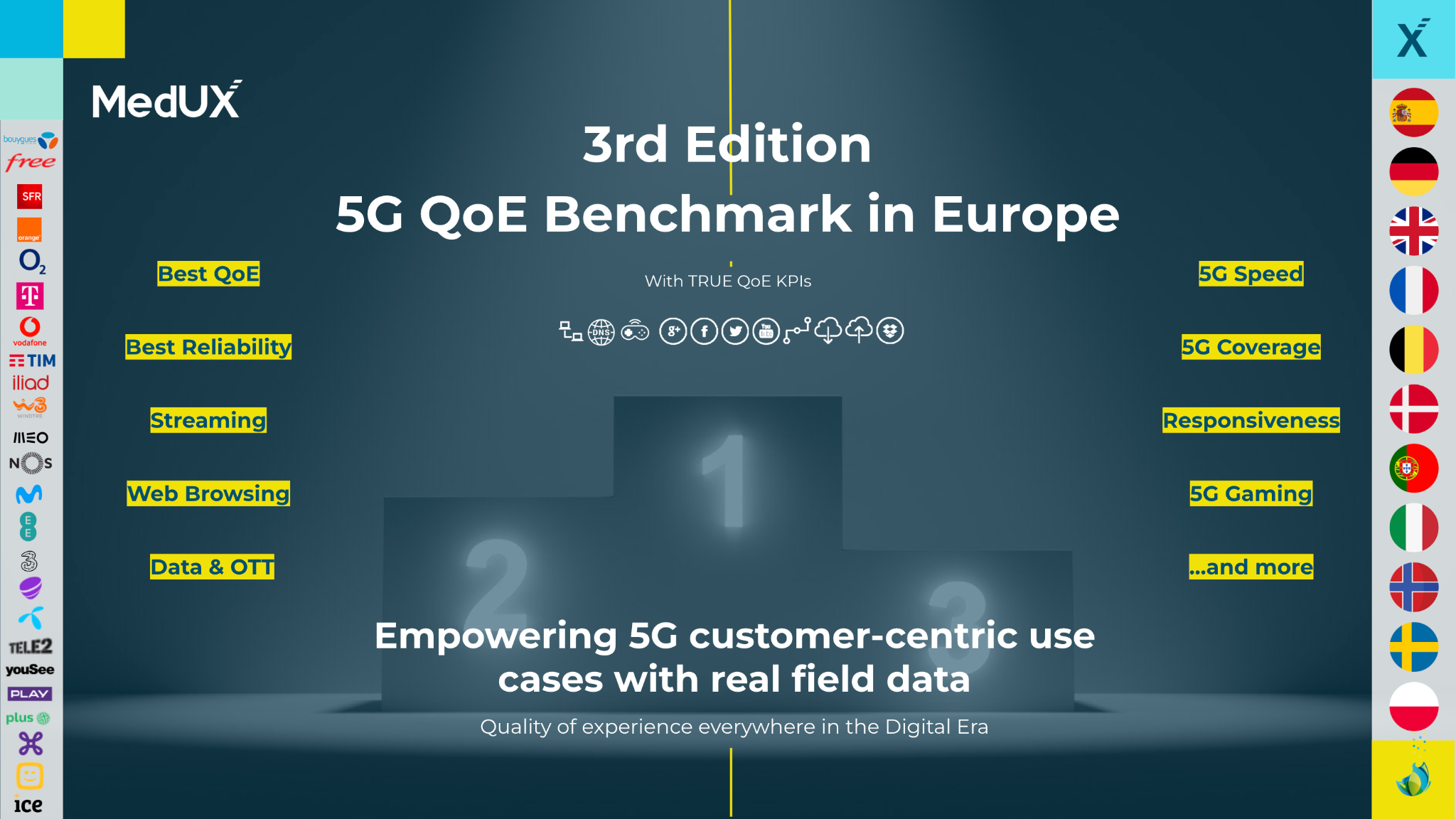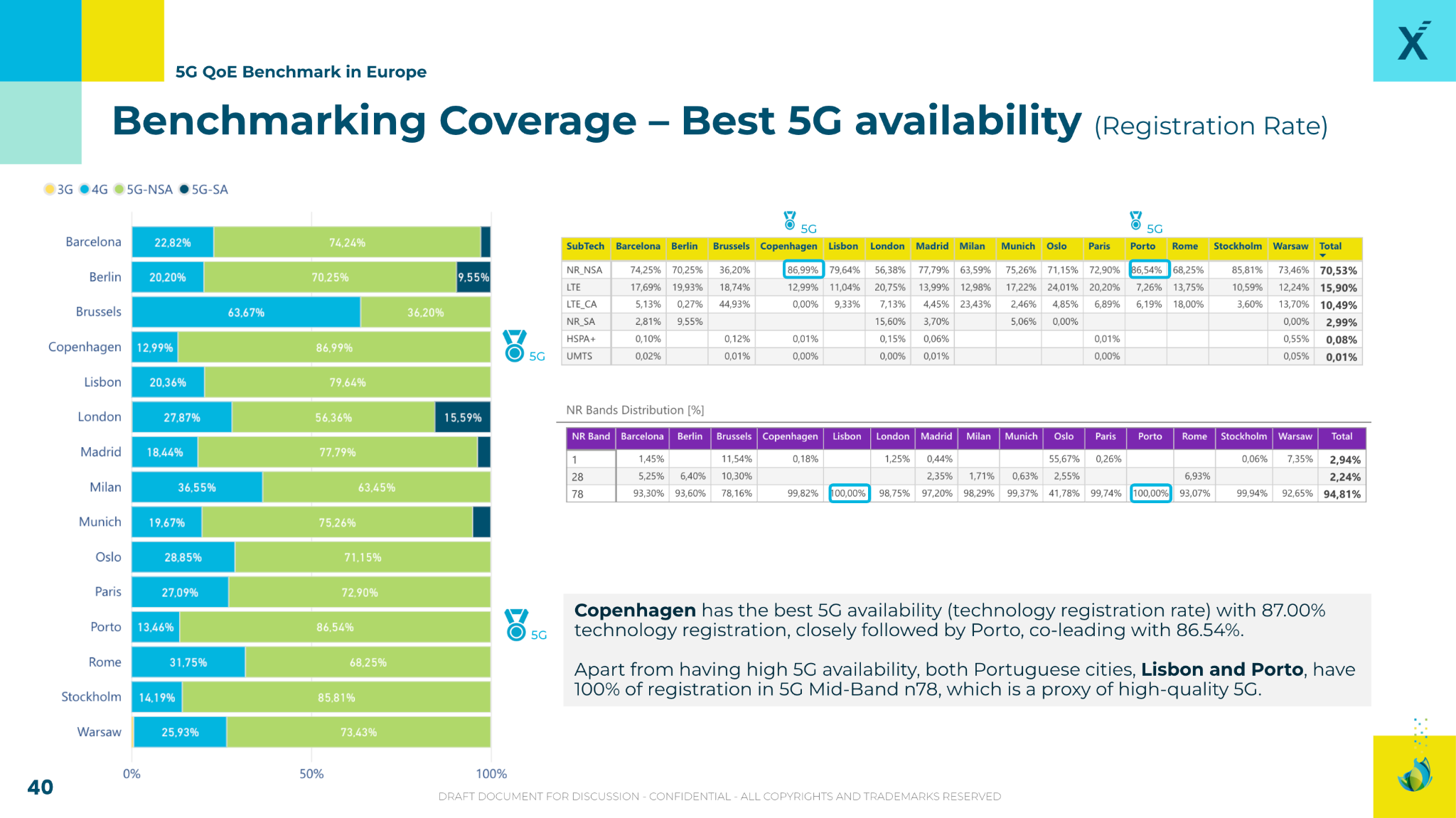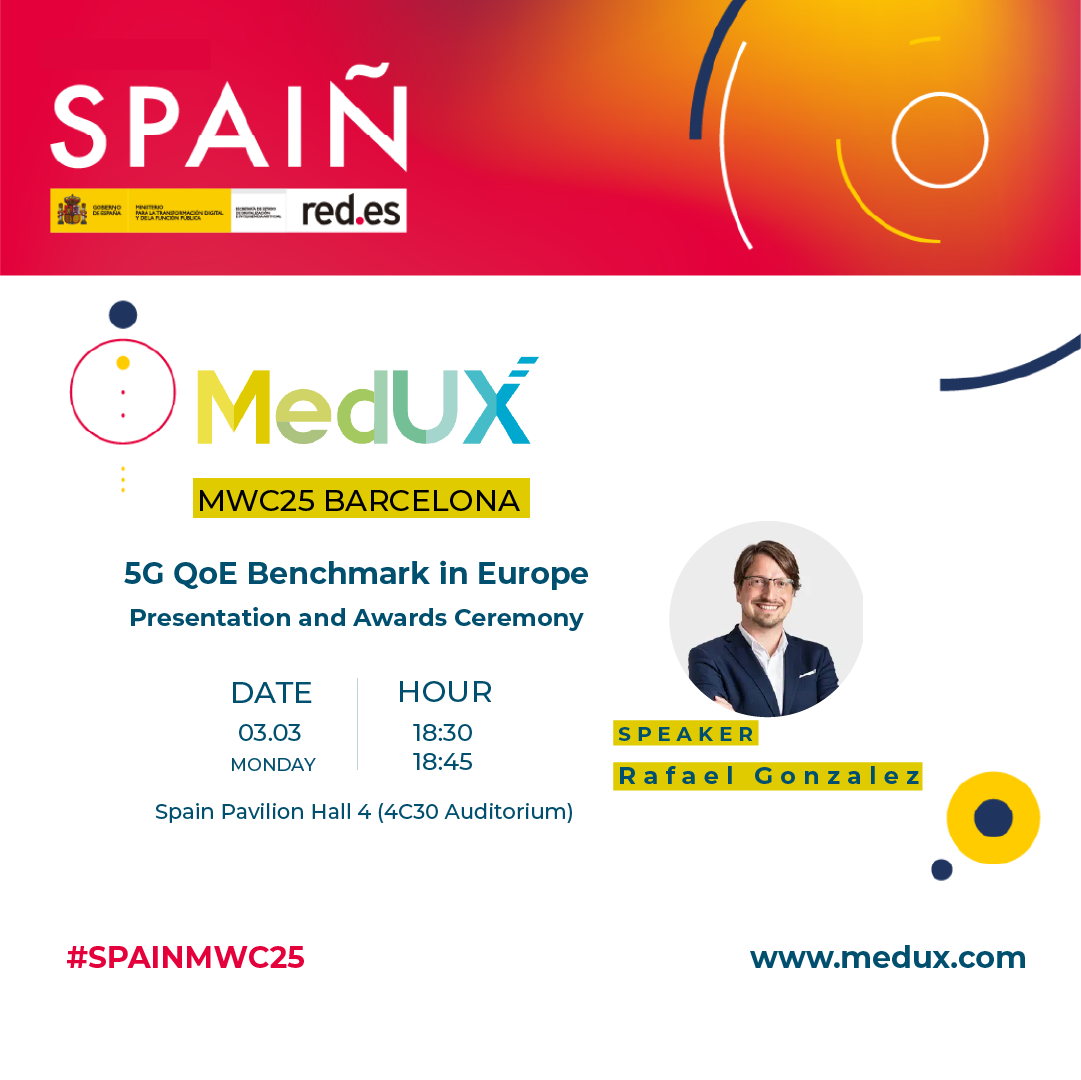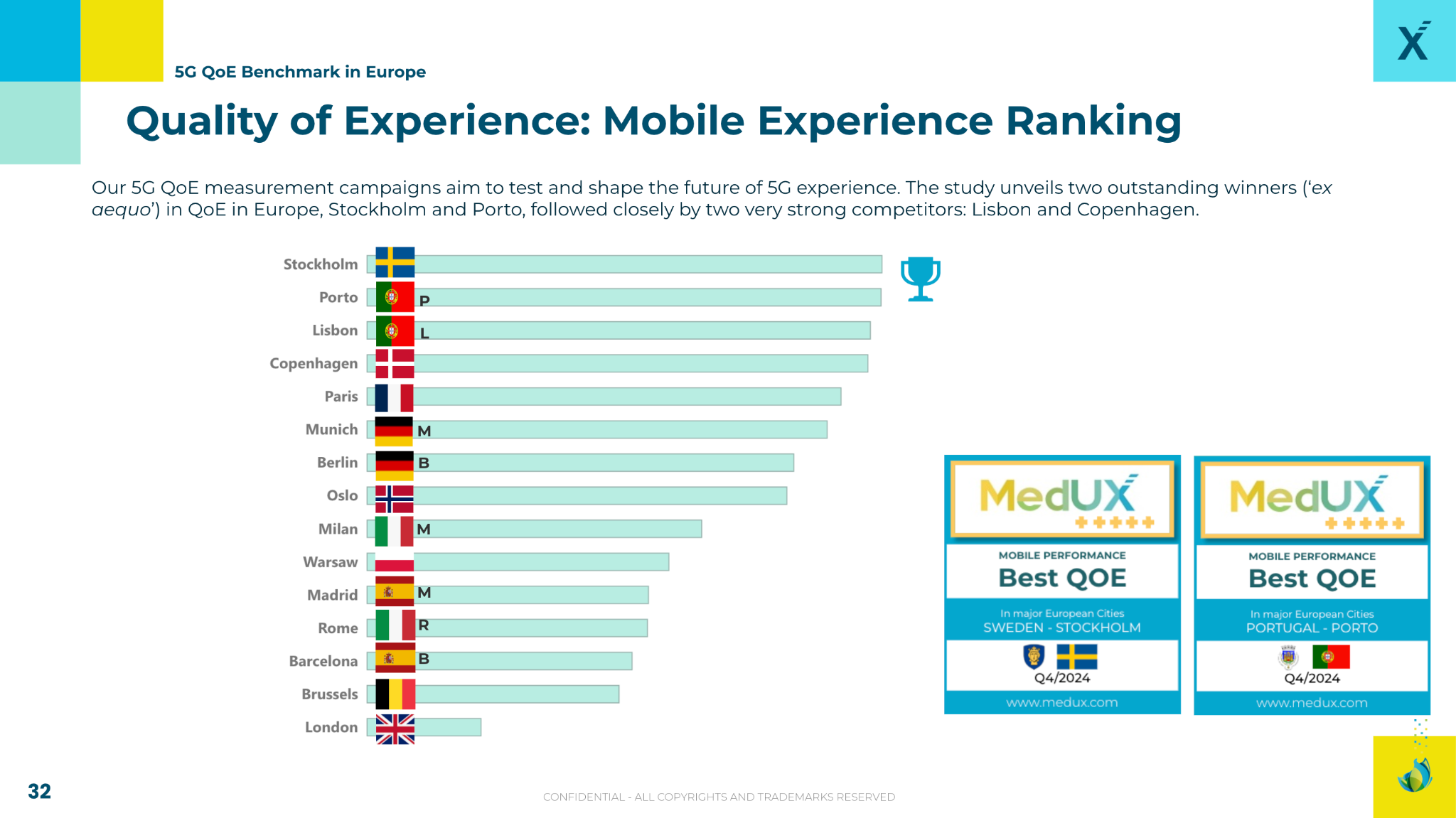All 5G networks are not created equal: Unveiling the TRUE QoE of 5G in Europe (III)

Which European city truly offers the best 5G QoE? And what sets it apart?
At MedUX, we’ve thoroughly analyzed this question to uncover the real state of 5G connectivity across Europe. As we gear up for Mobile World Congress 2025 in Barcelona, we’re excited to share our latest insights.
Beyond data analysis, our mission at MedUX is to redefine how the industry measures and understands 5G. High-capacity networks and widespread coverage are not just technological milestones—they are the foundation for delivering fast, reliable, and meaningful digital experiences that drive societal progress.

Moreover, our work aligns with the broader vision of the UN Sustainable Development Goals (SDGs) 2030, particularly in fostering innovation and infrastructure (Goal 9) and in promoting industry and economic growth (Goal 8). Robust 5G connectivity is a cornerstone for smart cities and communities (Goal 11), facilitating more efficient urbanization. It also plays a crucial role in democratizing access to information and education (Goal 4), helping to bridge the digital divide. By enhancing connectivity, MedUX contributes to building resilient infrastructure, promoting inclusive and sustainable industrialization, and fostering innovation.
The journey to a fully digital society is accelerating, fueled by 5G and fiber-based technologies. The 5G rollout remains strong, with telecom operators competing not only to provide the fastest networks but also the most reliable, consistent, and satisfying user experience as they expand their coverage.
5G has introduced major improvements over 4G technology. As expected, average 5G speeds are several times faster than those of 4G, but there is also a notable enhancement in reliability. However, greater improvements in time-to-content and video streaming and gaming experiences are still expected with the widespread introduction of 5G Standalone (SA). We continue to monitor this evolution and will provide updates as it becomes mainstream. However, 5G SA networks remain largely unavailable across Europe, limiting key benefits such as ultra-low latency, network slicing, Quality On Demand (QoD), and improved reliability. Our latest research indicates that only a handful of operators currently offer residential 5G SA plans, including Orange (Spain), Vodafone (UK), and Vodafone (Germany). On average, 5G SA registration time represents less than 3% across major European cities, highlighting the slow adoption and untapped potential of full 5G capabilities.

Please, register on our site here for a free copy of our report
Not all 5G experiences are created equal. The quality users perceive varies significantly, and we've set out to uncover the reasons behind it.Our comprehensive benchmarking campaign has analyzed 5G performance and Quality of Experience (QoE) across 15 major European cities, including Brussels (Belgium), London (United Kingdom), Berlin and Munich (Germany), Paris (France), Lisbon and Porto (Portugal), Rome and Milan (Italy), Madrid and Barcelona (Spain), Warsaw (Poland), Oslo (Norway), Copenhagen (Denmark) and Stockholm (Sweden).
Our study reveals, through an examination of on-the-field 5G measurements and genuine QoE Key Performance Indicators (KPIs), notable disparities among 5G networks in these major urban areas. Additionally, the investigation indicates that, even within a particular city, the 5G user experience may differ significantly based on the specific location.
While this report offers a comprehensive analysis at the city level to assess overall performance, MedUX also provides in-depth evaluations and statistics at the operator level.
We use our QoE Score, based on international best practices, to compare and rank operators' performance. This synthetic indicator aggregates a wide set of metrics into a single score, allowing for national and international comparison and in-depth analysis of strengths and weaknesses.
Our team of experienced engineers and data scientists has worked tirelessly to develop 5G-ready measurement robots and a rigorous and comprehensive methodology for testing and benchmarking 5G networks across Europe.
Join us in the launch of our report during the MWC25, on Monday, March 3rd at 18:30h in the Spain Pavilion (Hall 4 Stand 4C30-Auditorium).

Key Finding of our 5G QoE Benchmark in Europe
A lot has changed since our second 5G measurement during the launch of the first 5G networks in Europe, indeed more spectrum has been released all over Europe but at the same time 5G adoption and network load has increased. Which city has the best 5G network and service?
Please, register on our site here for a free copy of our report
Porto, Stockholm Lisbon and Copenhagen lead most mobile experience rankings across all categories, but the details reveal key differences.
- The best Overall QoE Experience is shared by Portugal and Sweden. Porto and Stockholm co-lead the most important categories and our Best QoE Award, showing outstanding stability across most mobile experience categories and KPIs. Lisbon and Copenhagen follow closely in third and fourth place for Best QoE.
- 5G experience is very good or excellent in most European cities. Our 5G QoE benchmarking results reveal:
- Four clear front-runners (Porto, Stockholm, Lisbon and Copenhagen)
- Six strong contenders in the excellence range (Paris, Munich, Berlin, Oslo, Milan and Warsaw)
- Five runner-ups (Madrid, Rome, Barcelona, Brussels and London).
- Despite regional differences, all cities achievedQoE scores above 3.7 on a 5-point scale.

- The most reliable experience is in Portugal. Lisbon leads the Best Reliability Award, the second most important category in the benchmark. The city stands out for its consistent network performance, with 99.63% successful Internet Sessions.
- Portugal and Denmark Leads in 5G Availability. 5G non-standalone (NSA) – i.e., where 5G supplements a 4G network – has expanded significantly across Europe, with average 5G registration times over 70% across the panel. Porto, together with Copenhagen, sets the benchmark for 5G availability, with 87% technology registration rate. However, the study still highlights significant gaps between top and bottom performers in terms of 5G availability, reinforcing the need for continued network expansion and optimization.
- Lisbon, Porto and Stockholm Deliver the Most Consistent 5G Speeds. Lisbon and Porto co-leads in 5G download speeds, while Stockholm ranks first in 5G upload speeds, showcasing exceptional performance in their respective categories.
- Lisbon recorded a typical (median) download speed exceeding 504 Mbps.
- Stockholm led in upload speeds, surpassing a 116 Mbps median.
- Porto followed as the second-best performer in download speed.
- Wide Disparities in 5G Speed Performance Across Europe. 5G speed performance varies significantly across major European cities, revealing two distinct groups:
- Top-performing cities: Stockholm, Oslo, Lisbon, Copenhagen, and Porto lead the way, with peak speeds exceeding 800 Mbps in the fastest 10% of sessions.
- Lower-performing group: Other cities fall within or below the 700 Mbps range, highlighting the existing speed gap in 5G deployments.
- Germany is top for 5G Gaming experience. In particular, Munich and Berlin co-lead the Gaming experience in 5G with the highest scores. According to previous research on gaming excellence, a widely accepted goal is to provide stable network latencies below 20 ms. With current 5G deployments, Munich has the best 5G Gaming experience thanks to the lowest latency of 37 ms and a jitter below 16 ms. A reliable latency of 30-50 ms is considered to be very good for most of the games.
- Portugal and Sweden Lead in Data and OTT Experience. Both Countries emerge as the top-performing countries in Data and OTT Experience, excelling in social networks, gaming, and cloud services.
- Porto takes the lead in this category, demonstrating high reliability across all services. It provides one of the most stable gaming connections, with the lowest average jitter at just 10 ms, and ensures quick cloud service performance, with download response times of less than 1 second for a 10MB file.
- Stockholm co-leads, delivering the best web browsing and file transferring experiences. It boasts top time-to-content performance, with web page loading times below 1 second, typically 20% faster than the average across all cities, and the fastest average upload speeds for file transfers—200% higher than the rest.
- The best Streaming experience is in the Nordics. Stockholm is the winner for video streaming experience, achieving 95% rate of 4K playback time in streaming sessions and the fastest time-to-play at 1606 ms. Copenhagen co-leads in this category, demonstrating strong video streaming performance.
- Android devices misrepresent true 5G connectivity up to 20% of the time, depending on the city and operator. Our field studies reveal that in many cases, a device may display a 5G connection while still operating on pure LTE infrastructure, failing to deliver the expected performance improvements. This discrepancy distorts the real adoption rate and effectiveness of 5G, leading to misleading user expectations and industry assessments.
- Our field measurements confirm that, on average, users in major European cities remain connected to 4G for 25% of the time. Moreover, even when connected to 5G (75% of the time), 10% of deployments lack mid-band spectrum. This limitation significantly reduces the transformative potential of 5G, highlighting the urgent need for policy and investment shifts toward dedicated mid-band spectrum deployments to unlock the full benefits of next-generation connectivity.
Closing Insights: Not All 5G Networks Are Created Equal
Our research reaffirms a fundamental truth: 5G networks are not built equally, and their performance can vary significantly across cities and regions.
The TRUE Quality of Experience (QoE) measured in our study highlights notable disparities. These differences directly impact how users experience connectivity in real-world scenarios—from streaming and gaming to cloud services and other digital applications.
To remain competitive in the Digital Era, network operators must leverage these insights to enhance QoE, ensuring that 5G networks meet the expectations of a hyper-connected society. Closing the gap between basic and advanced 5G capabilities will be key to unlocking the full potential of next-generation connectivity.
What do you get by joining the #QoERevolution with MedUX?
This benchmark will allow telecommunications operators, service providers, and regulatory authorities to gain a deeper understanding of the true performance of 5G networks from a customer perspective.
Speed is not everything. While fast download rates make headlines, real-world customer experience is shaped by many other factors. In the 5G era, network reliability, service consistency, and content delivery performance are just as, if not more, important than raw throughput or simple latency measurements against test servers.
So, what do users care about in 5G? A consistent experience across services and applications is king, particularly application performance and time-to-content everywhere and every time, at every click to a video, websites, social networks, cloud storage, games, etc.
Why Does QoE Matter?
Quality of Service (QoS) has long been the industry standard, but MedUX's focus shifts towards QoE—a more holistic view of network performance. This shift is crucial for understanding the real-world implications of 5G technology, especially as the industry navigates through the nuances of NSA and SA deployments.
In our continuous effort to demystify 5G performance, MedUX employs its innovative mobile measurement technology, MedUX MOBILE, harnessing over 200 performance indicators and metrics. This approach not only offers an in-depth analysis of network performance but also aligns with our mission to assist clients in planning, deploying, monitoring, and optimizing 5G networks from a customer's perspective.
Our 5G QoE benchmark can cover a wide range of scenarios and use cases, including urban, suburban, and rural areas, indoor and outdoor locations, or any other strategic location or vehicles in mobility, such as buses, trains, and metros, thanks to our grand-scale flexible deployment capability. MedUX focuses on evaluating the QoE that mobile end-users have when using telecommunication services, also referred to as customer-perceived network quality or network experience.
Please, register on our site here for a free copy of our report
Discover more about our methodologies, insights, and how MedUX is shaping the future of 5G connectivity.
Let’s make time to meet at MWC25. We are ready to unlock extraordinary digital experiences with MedUX. Please visit the following link and book a meeting at MWC25 Barcelona.
To learn more about our 5G use cases on competitive intelligence, pre- and post-rollout analytics, and basic troubleshooting, and how they can benefit your business, please visit our website at www.medux.com .
For detailed insights and comprehensive data from our 5G QoE study, contact us at hello@medux.com.
Don’t forget to follow us on social media and subscribe to our newsletter to receive the latest updates and news.
Follow us on:
About MedUX
MedUX is the leading Quality of Experience (QoE) company, providing comprehensive and innovative solutions for measuring the performance of fixed, mobile, and TV telecommunications networks for telecom operators, governments, and digital enterprises. With a focus on delivering grand scale, end-to-end network, and service visibility, MedUX leverages real-time customer perspective data and advanced analytics to ensure quality and regulatory compliance, while also offering valuable insights for optimizing networks and improving customer experiences. With a presence in over 25 countries across Europe, America, Africa, and the Middle East, and monitoring over 60 operators worldwide, MedUX’s patented technology and expertise make it a trusted partner for improving the digital experiences of customers everywhere.
Explore the Latest from MedUX

MedUX Joins Phase V of TM Forum Catalyst Project: Boosting QoE with Sustainability, Gen AI, and 5G Slicing
In today’s hyperconnected world, ensuring a consistent, high-quality digital experience isn’t a luxury—it’s a competitive necessity. That’s why MedUX is proud to participate in Phase V of the TM Forum Catalyst project, “Autonomous Customer Experience Index (CEI) for Zero-Touch 5G and Wi-Fi…

Redesigning Quality of Experience in the Digital Era at #MWC25
Join the Quality of Experience (QoE) Revolution with MedUX: Scalable, Customer-Centric, and Cost-Effective Testing and Monitoring Solutions Trusted by Top Brands Worldwide. Discover how we are transforming network performance at Mobile World Congress 2025.As we approach the largest and most…

Brussels’ 5G Falling Behind: A Wake-Up Call for Belgium’s Connectivity Strategy
Infrastructure deployment delays, regulatory barriers, and inconsistent performance — can Brussels reverse its status as one of Europe’s weakest 5G cities?
5G is a critical enabler of Europe’s digital transformation, powering economic growth, innovation, and social progress. The European…
